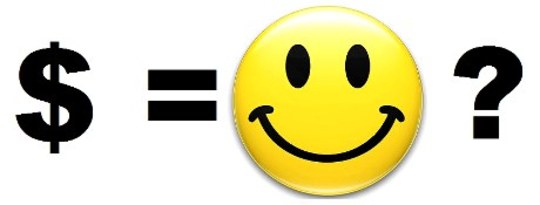
How important, if at all, is having more money for our happiness and well-being? Unsurprisingly this question stimulates a lot of opinion and debate. But are people accurate in their predictions about the benefits of having money?
A new study published in the Journal of Positive Psychology highlights that people are often mistaken in how spending our money might benefit our lives. People are prone to forecasting errors – that is, they mistakenly predict future events to be better or worse than they actually turn out to be.
In this latest study the researchers show that people predict that buying material possessions will be a better use of money than spending instead on life experiences. But once the purchases are had, the experience is what’s perceived to have been a better use of money, resulting in higher well-being. More or less, this confirms findings from other studies. And so it seems that a focus on having as opposed to being may limit human potential.
But what does this new study tell us about the importance of money for both happiness and well-being more generally? On the whole money matters much less than people think and has led some to conclude simply that money doesn’t make us happy because we aren’t spending it right.
My own research has also illustrated that we probably don’t spend our money on the things most beneficial for well-being. For example, we have shown that spending on psychological therapy would be an extremely cost-effective way of raising well-being. But, the message from our research is not that we should just spend our money better and that people underestimate the effect of purchasing certain things, as the authors claim in the latest study. Instead, our work highlights just how relatively unimportant money is at raising individual well-being compared to other more important things.
More To Life Than Money
 How to spend our money is not the only choice we have – we also have choices as to how we should live our lives and whether in fact we should spend so much time and energy pursuing money in the first place. Thus when we are trying to understand the importance of money for well-being it is one thing to compare types of spending, but really we should be comparing how important money is in relation to other things.
How to spend our money is not the only choice we have – we also have choices as to how we should live our lives and whether in fact we should spend so much time and energy pursuing money in the first place. Thus when we are trying to understand the importance of money for well-being it is one thing to compare types of spending, but really we should be comparing how important money is in relation to other things.
The reality is that how much someone earns contributes very little to their sense of well-being compared with other things such as social relationships, physical and mental health or how a person relates to the world around them. Focusing directly on these factors would probably do much more for our well-being rather than how we chose to spend our money.
We have demonstrated that personality change, for example, contributes substantially more to changes in well-being than income factors. People who, for example, become more open to new experiences or emotionally more stable, are much more likely to experience larger well-being changes than any change to their income.
Being materialistic is well-known to be detrimental to an individual’s well-being. Those that pursue wealth and possessions consistently report lower well-being than those that don’t.
So a better question to address than how we should spend our money is: “Why does more money seem to bring us very little well-being even though we often predict otherwise?”
Money and Social Standing
One reason is that people don’t care about how much money they have per se, but care more about the social position that their income gives them. But increases in an individual’s income won’t necessarily equate to a growth in social standing. And, while people may think that an income increase will bring greater well-being, this may not factor in that everyone else may experience an income increase at the same time.
It’s also been shown that income losses have a much greater impact on well-being than equivalent income gains. This suggests that any benefit that accrues from an income rise, whether at the individual or national level, may be completely wiped out by much smaller income losses. The importance of income is therefore not in obtaining it, but avoiding losing it. Only once it’s obtained does income become essential to maintain your current level of well-being and this may partly explain why it is believed to be so important for well-being.
The question as to whether more money brings greater happiness comes up time and time again and will no doubt continue to do so. Indeed it is an important question and how we spend our money is of course important – if we have money then of course it makes sense to use it wisely. But it would be a mistake to let the pursuit of money for the sake of happiness distract us away from the things in life that simply matter more.
The original article was published on TheConversation.com
About the Author
 Christopher Boyce is currently a Research Fellow at the Behavioural Science Centre in Stirling Management School. He also holds an Honarary position as a Research Associate in the School of Psychological Sciences at the University of Manchester. Christopher graduated from the University of Surrey with a BSc in Economics in 2005. He then moved to the University of Warwick to complete an MSc in Economics. At Warwick he then became interested in psychology and in 2009 completed a PhD in Psychology on the topic of subjective well-being. After his PhD he held positions as a Research Fellow at the Paris School of Economics, the University of Manchester, and at the Institute of Advanced Studies. His current research crosses the boundaries of economics and psychology and he tries to unite ideas from both disciplines. Specifically he is concerned with understanding how an individual's health and happiness is influenced by the world around them. Visit his personal page at The University of Manchester (UK). [Disclosure Statement: Christopher Boyce receives funding from the Economic and Social Research Council.]
Christopher Boyce is currently a Research Fellow at the Behavioural Science Centre in Stirling Management School. He also holds an Honarary position as a Research Associate in the School of Psychological Sciences at the University of Manchester. Christopher graduated from the University of Surrey with a BSc in Economics in 2005. He then moved to the University of Warwick to complete an MSc in Economics. At Warwick he then became interested in psychology and in 2009 completed a PhD in Psychology on the topic of subjective well-being. After his PhD he held positions as a Research Fellow at the Paris School of Economics, the University of Manchester, and at the Institute of Advanced Studies. His current research crosses the boundaries of economics and psychology and he tries to unite ideas from both disciplines. Specifically he is concerned with understanding how an individual's health and happiness is influenced by the world around them. Visit his personal page at The University of Manchester (UK). [Disclosure Statement: Christopher Boyce receives funding from the Economic and Social Research Council.]
Recommended Book:
How to Retire Happy, Wild, and Free: Retirement Wisdom That You Won't Get from Your Financial Advisor -- by Ernie Zelinski.
 What sets this retirement book apart from all the others is its holistic approach to the fears, hopes, and dreams that people have about retirement. This international bestseller (over 110,000 copies sold in its first edition) goes way beyond the numbers that is often the main focus of retirement planning. In short, the retirement wisdom in this book will prove to be much more important than how much money you have saved. How to Retire Happy Wild, and Free helps readers create an active, satisfying, and happy retirement in a way such that they don't need a million dollars to retire.
What sets this retirement book apart from all the others is its holistic approach to the fears, hopes, and dreams that people have about retirement. This international bestseller (over 110,000 copies sold in its first edition) goes way beyond the numbers that is often the main focus of retirement planning. In short, the retirement wisdom in this book will prove to be much more important than how much money you have saved. How to Retire Happy Wild, and Free helps readers create an active, satisfying, and happy retirement in a way such that they don't need a million dollars to retire.
Click here for more info and/or to order this book on Amazon.

























